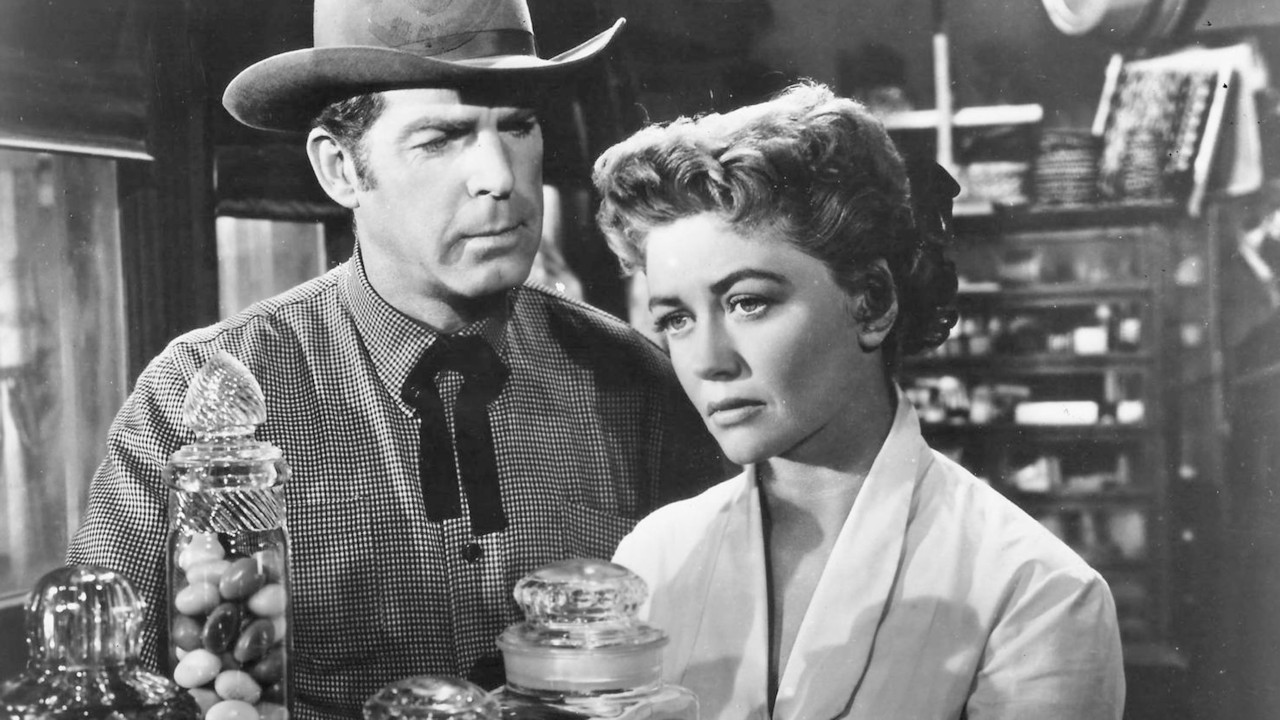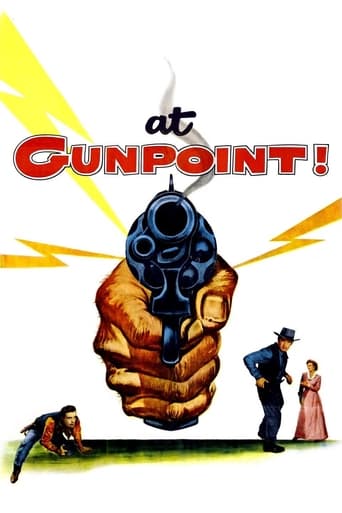

AT GUNPOINT is a typical Allied Artist B+ western: top lead actors (Fred MacMurray, Dorothy Malone, Walter Brennan), good direction and camerawork, ambitious if overwrought score by Carmen Dragon and a spotty script by Daniel Ullman -- great situations and scenes, some awful dialogue.When some bank robbers hit a small town, storekeeper Fred MacMurray picks up a gun and squeezes off a shot -- and by a miracle brings down a bad guy a half mile away. Hurray! But the dead man's brother wants his vengeance.... and keeps killing the wrong man, resulting in the town turning against its former hero.Westerns are among the oldest of film genres, and along the way they accumulated so much baggage that they became symbolic fiction, like science fiction and fantasy (which has largely replaced them in the cinema). This movie has a strong political message, which it delivers, ultimately, overtly. This weakens it. A better western with political commentary, like HIGH NOON, could leave its subtext in the subtext. Still, for fans of B westerns, it's a lot of fun to see some money spent on a favored form of fun.
... View MoreDuring the 1950s, 90% of the westerns were based around two plots: the evil baddie who (often secretly) is trying to force everyone off their land as well as the town that's too cowardly to stand up and fight against evil. There have been tons of films based around these themes and "At Gunpoint" uses the second theme--the same one in "High Noon" and many other westerns. Just because things like this never actually occurred in the old west didn't seem to matter!The film begins with a gang robbing a bank in a sleepy little town. They kill a teller and the town comes out to try and stop the robbery. One of the locals gets off a lucky shot...and kills the gang leader. His hot-headed brother (Skip Homeier) is determined to come back to town and get revenge. The first one they kill is the Sheriff and eventually they're coming back for the guy who fired the lucky shot, Jack Wright (Fred MacMurray). However, one by one, the townsfolk provide to be cowardly weenies and it looks like Jack is just gonna get his head blown off sooner or later!The film is so, so familiar--so much so that even with some very nice acting and production values, it's just another western. Well done...and at least the ending itself was original.
... View MoreFred MacMurray was not fond of his westerns, his most famous quote was that "the horse and I were never as one". But he rode no horses in At Gunpoint. MacMurray plays the town storekeeper who takes up a weapon and together with Frank Ferguson shoots Jack Pickard head of a gang trying to rob John Qualen's bank. He gets the outlaw leader and saves the money. The town acclaims him and Ferguson, but Ferguson is ambushed by the same gang outside town, MacMurray becomes the town leper.Comparisons have been made with High Noon, but I think this resembles more 3:10 to Yuma and Johnny Concho. In those two westerns we had citizen heroes as opposed to cowboy heroes. There's no resemblance to John Wayne in MacMurray's role.Even his wife Dorothy Malone wants him to leave, but MacMurray wants to stay. His only friend is the town doctor Walter Brennan.This is a very good if somewhat unconventional western. Keep an eye on Skip Homeier as well. He's playing once again an evil punk.
... View MoreAbout 30 years ago, I was on vacation in Florida with my family. One rainy night in our motel we settled down to watch this movie, and it stuck with me forever. Even today, I can watch a movie, and a month later, I can't remember it - usually because it had terrible acting, an awful (or non-existent) plot, or both. But I will never forget, "At Gunpoint." I suppose another reason I remember this movie is because I was so young, and the movie had adult themes. But I understood the themes. I liked how MacMurray, the common man, became an unlikely hero. To me, this was a movie about heroism being thrust upon a person, and how MacMurray's character awkwardly dealt with the responsibilities that came with that heroism. In kind of a backwards way, the heroism came first, then the courage, but only after a long, drawn-out, sweaty palms, interim battle with his own fears. I also liked the way the movie juxtaposed accidental heroism with the real, earned heroism in the same character--it defined heroism. This was also a movie about how a hero sometimes has to stand alone amidst a community of cowards, even if it means certain death, and that, sometimes, honor is more important than life itself. The suspense in this movie was gripping. When watching it, I felt MacMurray's nearly incapacitating fear as he waited for the dead bandit's friends to return and get their vengeance. Everyone should be able to easily relate to the universal themes in "At Gunpoint." I didn't comment on the details of the scenes of this movie for fear of getting them wrong - it has been over 30 years since I saw it.
... View More